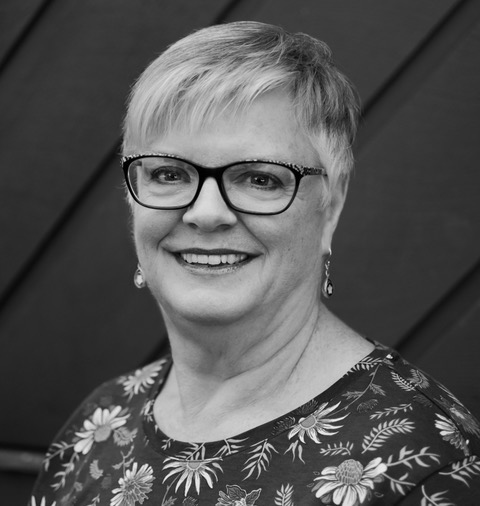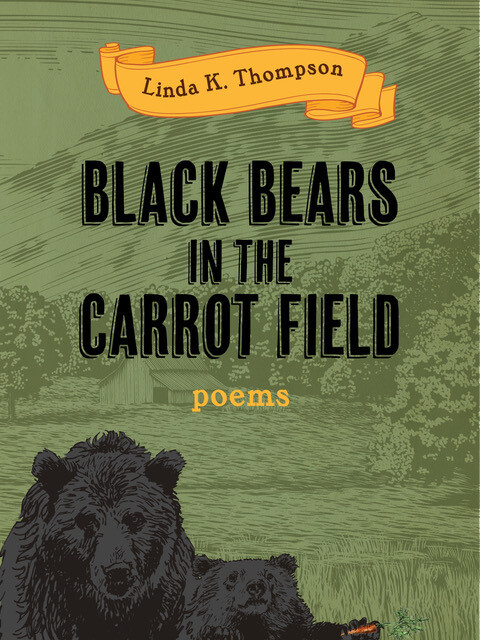Isn’t that a great title for a poetry collection? Black Bears in the Carrot Field is Linda K. Thompson’s debut poetry collection, published in July 2021 by Mother Tongue Publishing on Salt Spring Island B.C.
The title comes from Linda’s poem “Saying Goodbye”:
My family back on the mainland are sleeping
tight beside tall rocks. Dreaming about black bears
in the carrot field, and the Eiffel Tower
that has appeared in the middle of the barnyard.
Yes, a blend of the practical and the imagined or rather, the metaphorical.
Linda includes some notes in the back of the book so we learn that Linda’s brother, Bruce Miller, told her that “his friend and fellow farmer, David Hellevang, told him the story of the black bears in the carrot field. David and his crew were in the front field digging potatoes and, unbeknownst to them, the bears were in the back field ripping through and chewing up his field of carrots. Such a metaphor for life, don’t you think? Sometimes you just can’t win for losing. But you keep on keeping on.” There’s Linda K. Thompson’s philosophy of life in a nutshell, or rather in a potato skin.
Linda kept on keeping on learning from various (and famous) poets, being encouraged by friends and family along the way and published her poems in several publications including her own chapbook entitled Four Small People in Sturdy Shoes (Hot Tomato Studios, 2013). Her work has recently appeared in Prairie Fire and Release Any Words Stuck Inside of You: Canadian Flash Fiction and Prose Poetry.
Among the teachers Linda makes note of is Susan Musgrave, another B.C. poet who spends most of her time on Haida Gwaii. In recent years, both Linda and I have attended poetry workshops with Susan and in 2006, I think it was, we attended Susan’s workshop at the Victoria School of Writing where we met.
Linda and I attended many poetry retreats with the late Patrick Lane who is acknowledged as providing Linda with the two opening lines to her poem “Near Nice, France – 1941:
A paper lies on my desk, one corner folded under.
I won’t want to write about love again.
At the end of her “thank-yous,” Linda says: “And to Patrick, who understood my poems best of all.”
 Patrick’s fellow poet in love and in life, Lorna Crozier, has been our teacher at retreats in recent years and Linda thanks Lorna for her “midnight ‘poetry intervention’ — shoring up my spirits when I might have stalled along the rocky road to publication.”
Patrick’s fellow poet in love and in life, Lorna Crozier, has been our teacher at retreats in recent years and Linda thanks Lorna for her “midnight ‘poetry intervention’ — shoring up my spirits when I might have stalled along the rocky road to publication.”
Linda was born in 1950 at Vancouver General Hospital and was raised on a potato and cattle farm in the Pemberton Valley, B.C., a flat river valley with rugged coast mountains rising sharply on both sides. As Linda says in her notes: “100 years later, Pemberton is well known for its superior seed potatoes.” Linda’s Great Uncle Jack Ronayne followed the suggestion of a Department of Agriculture representative who, in 1922, thought farmers ought to take advantage of “this unusual isolation to develop and grow a disease-free seed potato.”
Linda has lived for many years in Port Alberni on Vancouver Island.
I asked Linda about her poem “My Story Begins” and what she meant by “thimble babies / that left the house in the night,” and I should have figured who she is acknowledging as the next lines are:
brothers and sisters that never
quite took, but we loved them anyway,
like we loved the eggs in the hatcher:
for the mystery of them.
Just like “old home week” as we call it when we run into old friends, Linda names lots of them including a couple of cows, Bopper and Fudge, in her poem “Cows in the Family.”
Linda may have known Kathleen and Steve and of course her sister Janet. Other may have been made up but sure have a “real” ring to them such as Dick Black, Ethyl Peach and Bud Fournier in her poem “Bob’s House. (There was also a family English sheepdog named Bob when Linda was young.)
The places beyond Pemberton in Linda’s poems include Taos, New Mexico where Linda attended a poetry workshop and still recalled her father in the cottonwood. (“Courtyard in Taos”) “Near Nice, France – 1941” is written in the voice of Monique, one of Henri Matisse’s models.
“Buffalo in Yellowstone” describes the narrator with Bob (there he is again!) and she says:
I had lots of time
to think about old boyfriends, which I do now and then,
when I’m feeling life is less than I had expected.
As for “Gone to Windsor,” a prose poem, one never knows what is fact and what is made up. We poets do that sometimes i.e. make things up.
You can count on humour throughout Linda’s collection. That’s what we always looked forward to at poetry retreats when Linda would read a poem she had worked on, long into the night, the day before. “Ye Olde Burd Turd Grocery” is one of the places she notes in “Mr. Carlisle” as well as the “Cut to the Chase Beauty Salon.”
There is much poignancy too such as in “Bring This Stone to the Grave.” The title is beautiful and the poem is a gorgeous memory of the pastures, “last fall’s potato fields,” the orioles and waxwings, and a stone “smooth as one of Father’s old Viyellas. The last lines are:
Still, the sun across the cottonwoods that line the Lillooet
will nearly break your heart.
Wow.
Black and white photos throughout the book, like a family album, are from Linda’s collection as well as from Pemberton & District Museum & Archives Society. The first photo is of Linda as a baby with her parents: Elsie Glover and Don Miller. It was taken in 1950, as Linda notes, “near Kamloops on trip home from Vancouver to purchase a new Chev truck and drive it to Lillooet to be loaded on PGE and delivered to Pemberton. There was no road in or out till the mid 60s.”
The next photo is of Don and Elsie’s farm c.1975, “looking south towards Mount Currie from the farmhouse.” The photo acts as a background to Linda’s poem “Home Ground.”
Hippocrates believed humans absorb the topographical influence
of the place they are born and separation from this place
can be injurious to one’s health. Susan tells me this is called “vivaxis.”
I do not know the word. But I know the feeling.
What a marvelous collection of poems celebrating family and place. While letting us know about a particular locale in British Columbia, Canada, the poems can’t help but hearten readers to remember their own beginnings and the “topographical influence of a place”.
You can order a copy of Black Bears in the Carrot Field from your local independent bookstore or directly from Mother Tongue Publishing. There is free shipping within North America.
Linda has some B.C. readings coming up:
September 25 at the Pemberton Museum
October 2 at the Victoria Writers Festival
October 16 at the Gabriola Library with Bill Stenson
I’ll ask her if she has any plans for Windsor.


I really enjoyed this review, Mary Ann. Linda sounds just like someone who I would love to meet, or read her works. Black Bears in the Carrot Field, such a quirky title, sounds exactly the type of book I’d love to read. Her sense of humour shines through so brightly.
Thanks Diana! We could hop on the ferry and go over to Gabriola on October 16th for Linda’s reading at the library. That would be fun! And I’ll see if she can come over for a salon in September or October so you can meet her in a small group setting.
Wonderful idea for a salon with Linda reading these delightful and heart warming poems. I’m intrigued by your review Mary Ann. I’ll be looking for a copy soon.